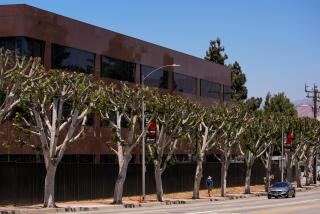Gophers, Over-Watering Can Damage Citrus Trees
- Share via
Question: My citrus tree’s leaves are turning yellow and dropping. What is causing this?
Answer: A variety of things can cause citrus leaves to turn yellow and drop. They are:
* Over-watering. Too much water is the most common cause of yellowing and dropping leaves. Irrigate less frequently. Once a week is too much--especially in cool winter months. When there’s rain, the tree may not need watering. Avoid placing nearby plants that need a lot of water, such as ferns and annual flowers.
* Girdling of the trunk by rodents such as gophers. Look for mounds of loose dirt and areas below the soil where bark has been chewed away. Control of rodents such as rats requires the elimination of attractive habitat, such as woodpiles and overgrown shrubs and groundcover. You can also use poisonous baits and traps.
* Root or crown damage. Observe the trunk of your tree for beads of gum and cracking of the trunk bark that could indicate fungal infection. To prevent fungal attack, keep the trunk dry, avoid mounding soil up by the trunk and prevent lawn-mower, weed-trimmer and pruning-tool damage to the tree base. If you feel that your tree is under fungal attack, consult a California Certified Nursery professional for further intervention and treatment options.
Mulches (if kept away from the trunk) have also been shown to decrease root rot in citrus.
* Mites and scale insects. If you think these pests might be attacking your citrus, take a leaf sample to your local CCN professional for confirmation of the invader.
* Excessive soil salts and excessive irrigation, which cause iron-deficiency symptoms. Iron chlorosis causes a yellowing of leaf tissues between the veins. If the deficiency is severe, new leaves will completely yellow and dieback will occur.
Zinc and manganese deficiencies are more common than iron deficiency; if in doubt, treat for all micronutrients.
May is the best month to apply foliar sprays, which are a good way to apply micronutrients.
Nitrogen is best applied in late December or January. If you use steer or chicken manure, it should be applied in the fall--and sparingly--because they are high in salt and may burn trees.
Have a problem in your yard? University of California Cooperative Extension (UCCE) Master Gardeners are here to help. These trained and certified horticultural volunteers are dedicated to extending research-based, scientifically accurate information to the public about home horticulture and pest management. They are involved with a variety of outreach programs, including the UCCE Master Garden hotline, which provides answers to specific questions. You can reach the hotline at (714) 708-1646 or send e-mail to ucmastergardeners@yahoo.com. Calls and e-mail are picked up daily and are generally returned within two to three days.






